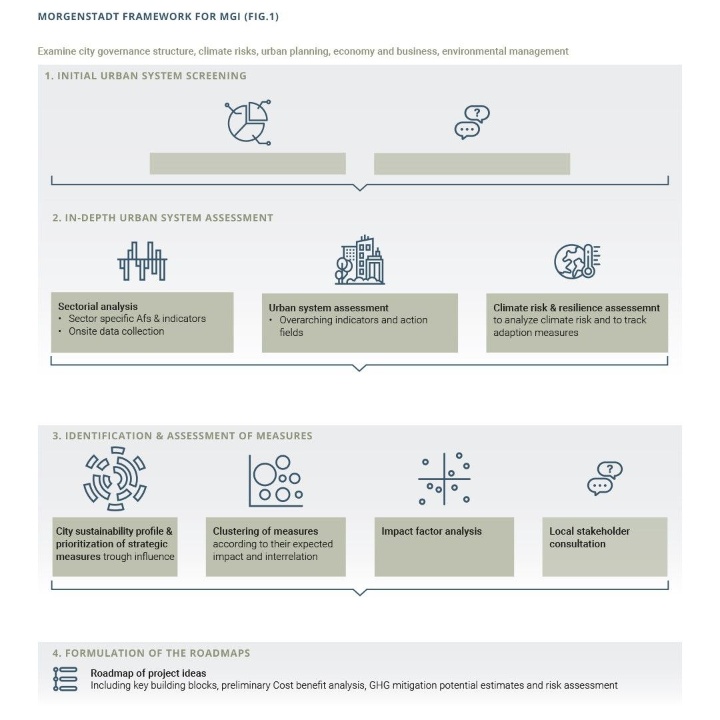It takes international cooperation to tackle a global challenge like climate change. Yet local solutions, adapted to the specific conditions in individual cities, are also required. In response to this need, the Morgenstadt Initiative, coordinated by the Institute of Human Factors and Technology Management IAT at the University of Stuttgart, is using so-called city labs to draw up a sustainability profile and action-based road map for pilot cities such as Kochi, Saltillo and Piura.
Climate change is one of those global challenges that can only be met through coordinated international action. Yet individual cities also face their own, specific ecological and socioeconomic pressures. Moreover, they each have different policy imperatives and must balance the competing interests of various stakeholders. Any measures and solutions must therefore be adapted to the needs on the ground and in close discussion with local people. As part of the drive to meet international climate targets, the Morgenstadt Global Smart Cities Initiative (MGI) is seeking to produce innovative and environmentally aware approaches to urban development. Its key aims are to mitigate the impact of climate change in cities, increase their resilience to climate risks, improve the natural resource base, and preserve local ecosystems – while also boosting the local economy. Pilot cities include Kochi, in India; Saltillo, in Mexico; and Piura, in Peru.
The MGI is coordinated by the Institute of Human Factors and Technology Management IAT at the University of Stuttgart, which works closely with the Fraunhofer Institute for Industrial Engineering IAO. It is funded by the International Climate Initiative (IKI), a program established by Germany’s Federal Ministry of the Environment, Nature Conservation and Nuclear Safety (BMU). Through its membership of the Fraunhofer Morgenstadt Initiative, the MGI can draw upon many years of experience and knowledge-sharing from cooperation with international research partners, municipalities and companies within the Morgenstadt network. The first report – on the city of Kochi – has already been published; reports on the remaining cities are to follow over the second half of this year.
Innovation, clean technology and a broad stakeholder dialog
The MGI follows the city lab approach, as developed by the Morgenstadt Initiative: the use of a holistic, analytic framework to design an individual sustainability strategy for cities. Based on innovation, clean technology and a broad stakeholder dialog, this framework also incorporates the ISO standards for sustainable cities and communities, which include indicators for city services and quality of life, and for smart cities and resilient cities. In the course of a city lab, the research team spends several weeks on location, first conducting an in-depth analysis of specific urban sectors, including water and energy, and then developing an individual sustainability profile based on inspections, discussions and workshops with local stakeholders. Prime issues here include identifying key stakeholders and incorporating the overall process in local policymaking. “In our pilot cities, we have seen firsthand the importance of engaging deeply with local stakeholders and responding to specific local needs by listening carefully to people with local experiences. Many sustainable solutions may be appropriate in the context of one city, but not in that of another”, says Catalina Díaz, project coordinator at the IAT at the University of Stuttgart.
The resulting sustainability profile presents the strengths, weaknesses and areas of need of the urban system under consideration and identifies potential opportunities and risks in line with three levels of analysis. On this basis, researchers then work with local stakeholders to draw up an action-based road map, which includes innovative measures and projects, and to set in motion its implementation and funding.
International collaboration as key to initiative’s success
The Morgenstadt Initiative is a network of Fraunhofer Institutes, municipalities and companies. Founded in 2012 by the Fraunhofer Institute for Industrial Engineering IAO, its mission is to devise, develop and trial innovations for tomorrow’s cities. The key to the initiative’s success is close international cooperation between research, business and municipal authorities, backed up by the combined experience and expertise of the Morgenstadt network. This is exemplified in the city lab approach, which was developed in cities such as Copenhagen, Singapore, New York, Tokyo, Leipzig and Sabadell, and has since been successfully implemented in Berlin, Prague, Lisbon, Chemnitz, Joinville and Coimbatore. For the purposes of the MGI, researchers have modified the city lab methodology so as to incorporate the latest findings and thinking on climate change adaptation and mitigation. At the same time, knowledge-sharing between partners has revealed synergies between the measures to achieve COVID-19 resilience and those to achieve climate resilience, given that both impact the health and livelihoods of city dwellers, particularly in the areas of energy and urban planning. As part of a webinar series to promote capacity building and knowledge transfer, MGI hosted its own webinar on this topic, under the title “Linking COVID-19 response to climate action”.
(c) Fraunhofer IAO
Expert Contact:
Catalina Díaz, University of Stuttgart, Institute of Human Factors and Technology Management (IAT)/ Fraunhofer IAO, ,
Phone +49 711 970-2179, Mail



